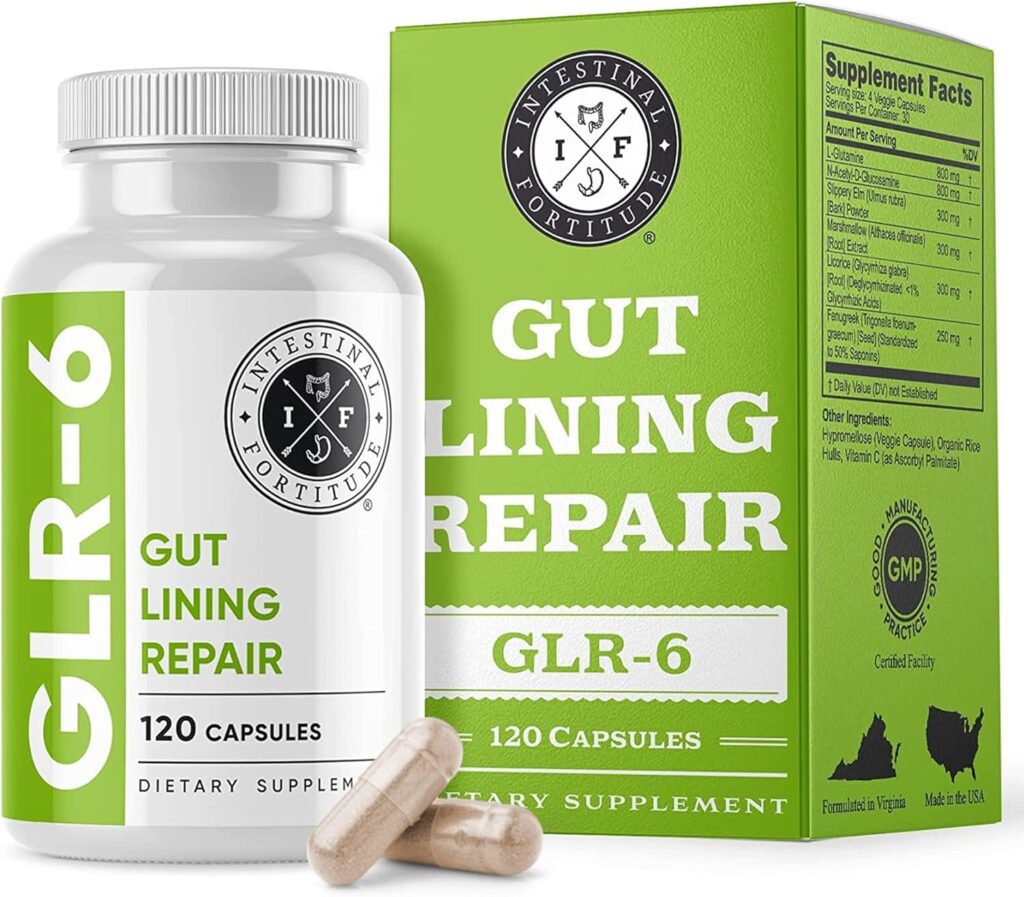Digestive discomfort can sneak into your life when you least expect it. Whether it’s an uneasy stomach, bloating, gas, irregularity, or that nagging feeling of fullness long after a meal, your GI Tract may be calling out for attention.
The good news? There are simple, natural ways to support your gut and feel better. These five gentle strategies are easy to add to your routine—and they can make a real difference.
1. Support the Gut Lining With a Targeted Supplement
Your gut lining is like a protective wall – it lets good stuff in and keeps the bad stuff out. But when it’s irritated or weakened, it can lead to all kinds of discomfort.
That’s where a targeted supplement like GLR-6 by Intestinal Fortitude comes in. It’s designed to support the health of your gut lining with ingredients like L-Glutamine, Slippery Elm, Marshmallow Root, DGL Licorice, and Fenugreek – all known for their gut-soothing properties.
People who take GLR-6 often report less bloating and a calmer digestive system. And because it focuses on gut lining support, it’s a smart starting point for anyone looking to feel better from the inside out.
Once you’ve built a solid foundation with a supplement, your food choices are the next step.
2. Eat Foods That Soothe, Not Stress
Food can either calm your gut – or stir things up. If your stomach is sensitive, focus on whole, simple foods that are easy to digest.
Cooked veggies like carrots, zucchini, and spinach are gentle and nourishing. For protein, try soft-boiled eggs, baked fish, or well-cooked lentils. And don’t forget fermented foods like yogurt, kefir, and sauerkraut. These help feed the good bacteria in your gut.
Try to cut back on common triggers, including:
- Fried or greasy foods
- Spicy meals
- Alcohol and caffeine
- Soda and sugary drinks
Making small food swaps each week adds up. Your gut will thank you.
3. Slow Down at Mealtimes
How you eat matters just as much as what you eat. If you’re always rushing through meals, your gut may struggle to keep up.
Eating slowly helps your body produce more digestive enzymes and break down food properly. That means less gas, less bloating, and a more comfortable stomach.
Try this:
- Take a few deep breaths before eating
- Chew each bite 20–30 times
- Put your fork down between bites
- Avoid screens during meals
These simple habits help your body shift into “rest and digest” mode – and that’s exactly where it needs to be.
4. Stay Hydrated Throughout the Day
Water plays a big role in digestion. It helps move food through your system and supports regularity.
Aim for 8–10 cups a day, and try to sip consistently instead of chugging all at once. If plain water isn’t your thing, mix it up with herbal teas like peppermint, ginger, or chamomile. Warm lemon water in the morning is also a great way to wake up your digestive system.
Avoid sugary drinks, soda, and too much coffee – they can irritate your gut and dehydrate you.
5. Manage Daily Stress
Your brain and your gut are more connected than you think. When stress levels rise, your digestion can slow down or act up.
You don’t need to eliminate stress completely—but building in a few calming habits can help your gut stay on track.
Try:
- Deep breathing
- A short walk outside
- Stretching or gentle yoga
- Listening to calming music
Even five minutes a day makes a difference. Less stress = a happier gut.
Give Your Gut the Gentle Support It Needs
Taking care of your gi tract doesn’t have to be complicated. These five natural habits – starting with GLR-6 by Intestinal Fortitude – can help soothe your GI tract and support a more comfortable, balanced body.
Remember, the small things you do each day make the biggest impact. Your gut works hard for you – show it a little love, and it’ll return the favor.
Thank you for reading!
Affiliate Disclosure
Some of the links on this site are affiliate links. This means that if you click on the link and purchase the item, we may receive an affiliate commission at no extra cost to you. I only recommend products or services that I believe will add value to my readers, however, some (not all) do pay us to be on this blog. Your support and theirs help keep this blog running, and I genuinely appreciate it.
Medical Disclaimer
The information provided on this website is for educational purposes only and is not intended as medical advice. This blog or the writer is not a licensed healthcare professional, and the content should not be used as a substitute for professional medical diagnosis, treatment, or advice. Always consult with your physician or other qualified healthcare provider before starting any new treatment or making any changes to your healthcare routine.
